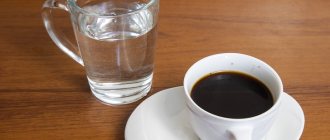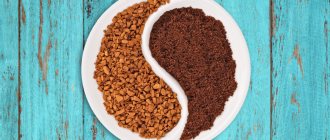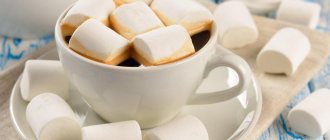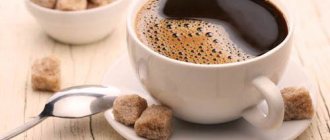Natural coffee beans contain many elements, each of which affects the body in a certain way. Therefore, a cup of coffee not only gives energy and pleasure, but also activates physiological processes. Researchers know exactly why coffee makes you want to go to the toilet, and have even made special recommendations for drink lovers: how and when to drink it so as not to end up in an awkward position.
The reason why coffee has laxative and diuretic effects
Many coffee lovers notice a certain dependence. After a fragrant cup of coffee, they almost immediately feel that they need to visit the toilet, including not only for minor needs. Why is this happening? Science will answer this.
Yes, indeed, coffee affects some people as a diuretic (most people), but for other lovers of a tonic aromatic drink, the tart fragrance of which cannot be confused with anything else, coffee acts as a laxative. Moreover, from some types of drink the effect can be so strong that a person can think about food poisoning. As they say, to get to where you need to go! However, in reality there is nothing criminal about this. Only physiology and chemistry.
Indeed, it (coffee) can stimulate intestinal peristalsis (wave-like contraction of the walls of hollow tubular organs (esophagus, stomach, intestines, etc.), promoting the movement of their contents), which is why sudden urges may occur. But which effect we will feel more depends on our body and the way the body perceives the substances included in the drink. However, there are also people for whom this drink has no effect. But there really aren't that many of them.
Can it be used continuously as a laxative?
Experts note that all the features of the impact on the human body of a wide range of elements found in coffee have not yet been studied in detail. Constipation can be a consequence of poor diet, stress, chronic diseases and their exacerbations.
Regular consumption of coffee as a laxative clearly indicates the presence of persistent problems with stool. Accordingly, it is initially necessary to contact qualified doctors in order to accurately diagnose the cause of disturbances in the gastrointestinal tract and prevent the worsening of the disturbances.
When drinking coffee, it should be taken into account that it will have a negative effect on an empty stomach due to the production of hydrochloric acid, which in excess will provoke an increase in acidity, the development of gastritis and can even cause the formation of peptic ulcers.
Often chronic constipation is accompanied by hemorrhoids, or provoked by it. In this case, you definitely can’t abuse coffee, because... Increased doses of the drink can cause spasms and increase pain.
You should only use coffee as a laxative after consulting your doctor.
Why does coffee have this effect?
Doctors from the English hospital Royal Hallamshire Hospital decided to answer this question. To this end, researchers S. Brown, P. Kann and N. Reed conducted a survey of volunteers of both sexes.
The data they collected shows that people do have different experiences with coffee and its impact on bathroom urges. However, a common “symptom” was reported by a total of 29 percent of those surveyed. Moreover, 63 percent of respondents were women.
By studying data from volunteers, the researchers also determined that this feeling occurs in people regardless of whether they drink natural or instant coffee, whether it is “normal” coffee or decaffeinated coffee, which immediately helped to dismiss the influence of the drink’s most famous chemical compound, confirming that this alkaloid cannot affect the functioning of the walls of the body cavities - the intestines.
Treatment options
When determining how and with what to treat frequent urination in men or women, doctors use the results of the diagnostics. Based on them, the real causes of the phenomenon are established. Efforts are being made to eliminate the underlying cause, and with it the symptoms.
Treatment approaches are fundamentally different. Persistent urge to urinate in men can be relieved along with a male disease. If there is a bacterial infection, a course of medications is prescribed - antibiotics, painkillers. If the diagnosis reveals diabetes, the doctor will first take control of your blood sugar levels.
What component of coffee affects and gives this effect (laxative and diuretic)?
Ultimately, the researchers concluded that drinking coffee stimulates the production of the hormone gastrin. It, in turn, stimulates the stomach to produce more gastric juice and increases the motility of the colon. This, in turn, can - for some more, for others to a lesser extent - stimulate intestinal motility and, as a result, make you feel the need to defecate.
Moreover, from the experience of various coffee lovers, it can be noted that different varieties and types of coffee can act in different ways from the point of view of the laxative effect - some more intensely, others practically not at all.
What scientific research says
If not caffeine completely, then at least it was decided to do away with coffee. And of course, first of all, I started reading various studies about the relationship between caffeine and our emotional state. The results of the hunt for information turned out to be very interesting.
Cambridge concluded back in 2005 that caffeine can aggravate nervous conditions, and its excessive consumption causes symptoms very similar to many serious mental disorders. However, most doctors don’t even ask whether you drink coffee or not when they make serious diagnoses. Of course, caffeine does not have this effect on everyone: if you have problems with your emotional state, you may be at risk. People with panic disorders and social phobia are especially sensitive to this substance; caffeine can cause panic attacks in them.
“In my practice, the issue of the amount of coffee is discussed with almost every patient, since for many diseases its consumption needs to be reduced. This is an exacerbation of gastritis, peptic ulcer, heartburn. But still, even in such cases, we allow up to two cups a day,” says Elena Volodkina, a gastroenterologist and nutritionist at the Aging Control clinic. “Caffeine stimulates the nervous system, and if a patient has a predisposition to irritability, is tense and anxious, then caffeine may have a negative effect on them and worsen these symptoms.”
Diuretic caffeine
But what about those who, after drinking coffee, feel that they need to quickly go to the toilet for a minor need?
This question relates to the topic of caffeine content in the drink. This particular alkaloid is a stimulant that usually increases urine production. This alkaloid blocks the production of antidiuretic hormones, stimulates blood flow and activates the adrenal glands. The amount of urine increases, and you want to run more often at “00”, which, in turn, can lead to mild dehydration and subsequent constipation. see also
By the way, research conducted in 2002 shows that those who drink coffee regularly have a greater tolerance for the urge to urinate, so they don't have to. go to the toilet frequently, even after they have drunk 2-3 cups per day.
Why did I start looking for the problem in caffeine?
I guessed that the problem lay in the coffee - there have been no other strong changes in my life recently. But I was encouraged to try not just to reduce the dose, but to completely give up this drink, because of the result of the genetic test that I took at Atlas when preparing one of our materials. It clearly stated: my body is slowly eliminating caffeine. This means that several cups drunk in one day work with double force. For those who like theoretical descriptions, I will clarify that I have the CYP1A2 gene, which reduces the activity of cytochrome, as a result of which caffeine remains in the body longer and provokes unwanted side effects. Moreover, the problem lay precisely in the coffee—tea did not cause such emotional states. This is because tea contains tannins, which make caffeine less absorbable and less effective.
Instagram content
This content can also be viewed on the site it originates from.
Coffee: a diuretic or a laxative?
Despite this, coffee is not a laxative. It may help with mild constipation, but only for 30% of people. However, as we said earlier, by removing fluid from the body, coffee can only do harm.
As for the diuretic, if you drink coffee rarely, you can try using it on an occasional basis, it will help. But if you drink coffee often, the effect of caffeine will gradually disappear.
And don’t forget that self-medication without medical help can be dangerous to health or even life!
But you need to remember the effects of the odorous drink. Especially for those who like to drink a cup of tart before work. Especially on an empty stomach. When your stomach gets sick on the road and you need a restroom that isn’t nearby, what an “adventure” it will be!
Should you worry if coffee makes you want to go to the toilet?
Researchers claim that not everyone experiences the laxative effect of coffee, approximately 25-30% of people. The diuretic effect occurs much more often, and all coffee consumers experience it to one degree or another.
Does this mean that there is something wrong with the body?
You can rest assured. If after coffee you want to go to the toilet, then the body’s regulatory system is working normally, without failures or disturbances.
To avoid awkward situations in everyday life, doctors give the following recommendations.
- In the morning, drink coffee no later than an hour before leaving the house, especially if you have a long commute.
- Drink the drink no later than 30-40 minutes before leaving places equipped with sanitary facilities.
- The larger the serving of coffee, the greater the diuretic effect it can have.
- During a business meeting or negotiation, you should drink coffee with caution, especially if you know that the drink has a laxative effect for you. It is better to limit fluid intake before long and important communication.
When not to drink coffee
Gastroenterologists categorically do not advise drinking coffee for people with gastrointestinal dysfunction when:
Read also: Symptoms of intestinal rupture, main causes, diagnostic tests
According to pediatricians, it is advisable for adolescents under 16 years of age to exclude the use of an invigorating drink from their diet. The stimulating effect of coffee can have a detrimental effect on the development of the young body as a whole.
How can you replace a coffee drink without harming your health?
Coffee substitutes may be more beneficial for the body. For example, drinks based on barley or acorns. Having similar characteristics, they perfectly quench thirst, restore strength and give vigor. Due to their beneficial properties, such drinks strengthen stools, have a beneficial effect on peristalsis, and support the immune system.
The starch included in the acorn drink envelops the inner mucous membrane of the stomach with a protective film, which prevents irritation of the walls and at the same time reduces the harmful load on the pancreas.
One of the components of barley drink is quercetin. The substance has an antispasmodic effect. Regular use relieves abdominal pain, improves well-being, and has a calming effect. Barley drinks are recommended for people with chronic diseases of the gastrointestinal tract - cholecystitis and pancreatitis.
Barley is the healthiest coffee drink
Chemical composition
To understand the principles of the drink’s effect on the body of an adult, it is worth finding out what kind of substances are contained in the grains.
- Caffeine. Herbal psychostimulant. Activates information exchange receptors, increases physical endurance.
- A nicotinic acid. A derivative of B vitamins. Participates in metabolic processes, reduces cholesterol levels, promotes the dilation of small blood vessels and optimizes blood microcirculation.
- Trigonelline. An alkaloid organic compound that provides odor and specific aroma.
- Trace elements and tannins. They are responsible for improving the tolerance of mental stress, saturate the body with amino acids, which increase the level of endurance and emotional stability.
A natural product made from coffee beans can cause both harm and benefit. The individual effect of the drink depends on the characteristics of the body and the amount drunk. For example, if diarrhea occurs from coffee with milk, gastric dysfunction may occur due to enzyme deficiency.
Diarrhea and coffee - what is the relationship?











